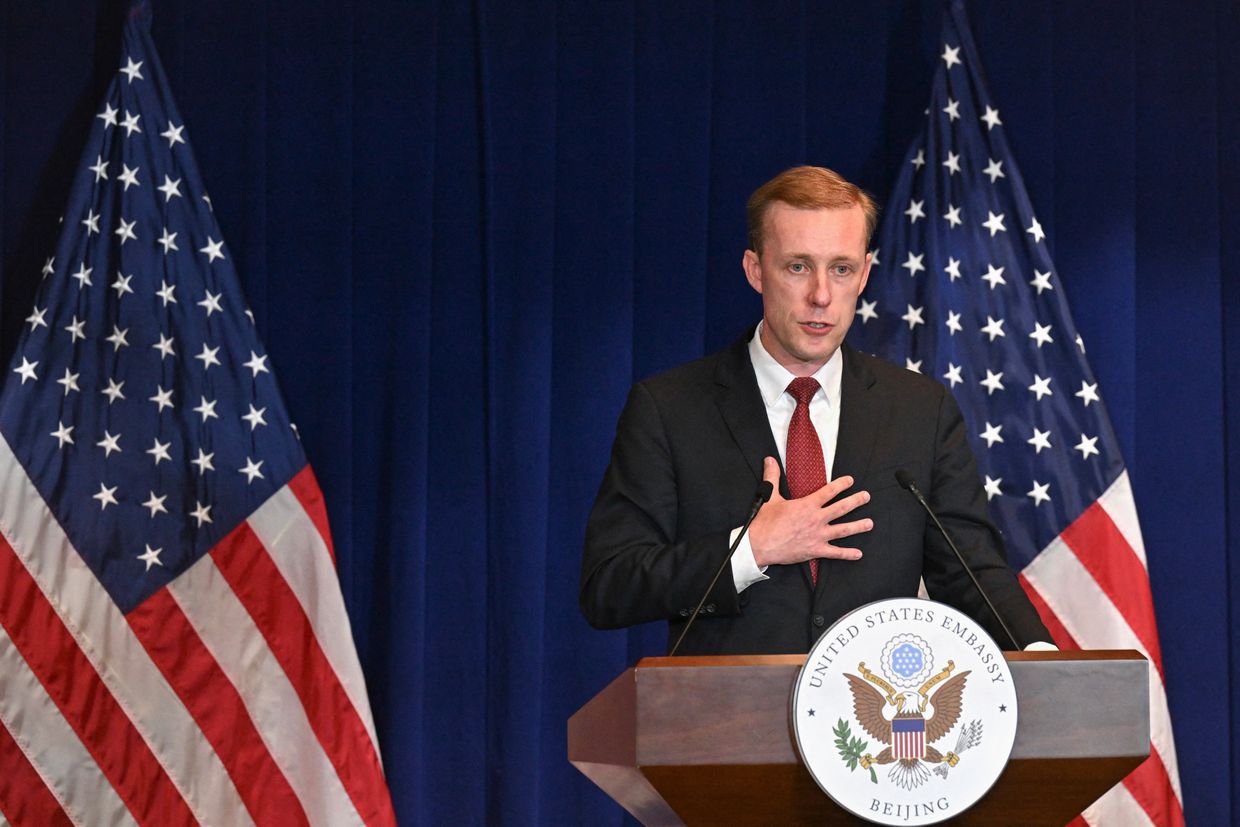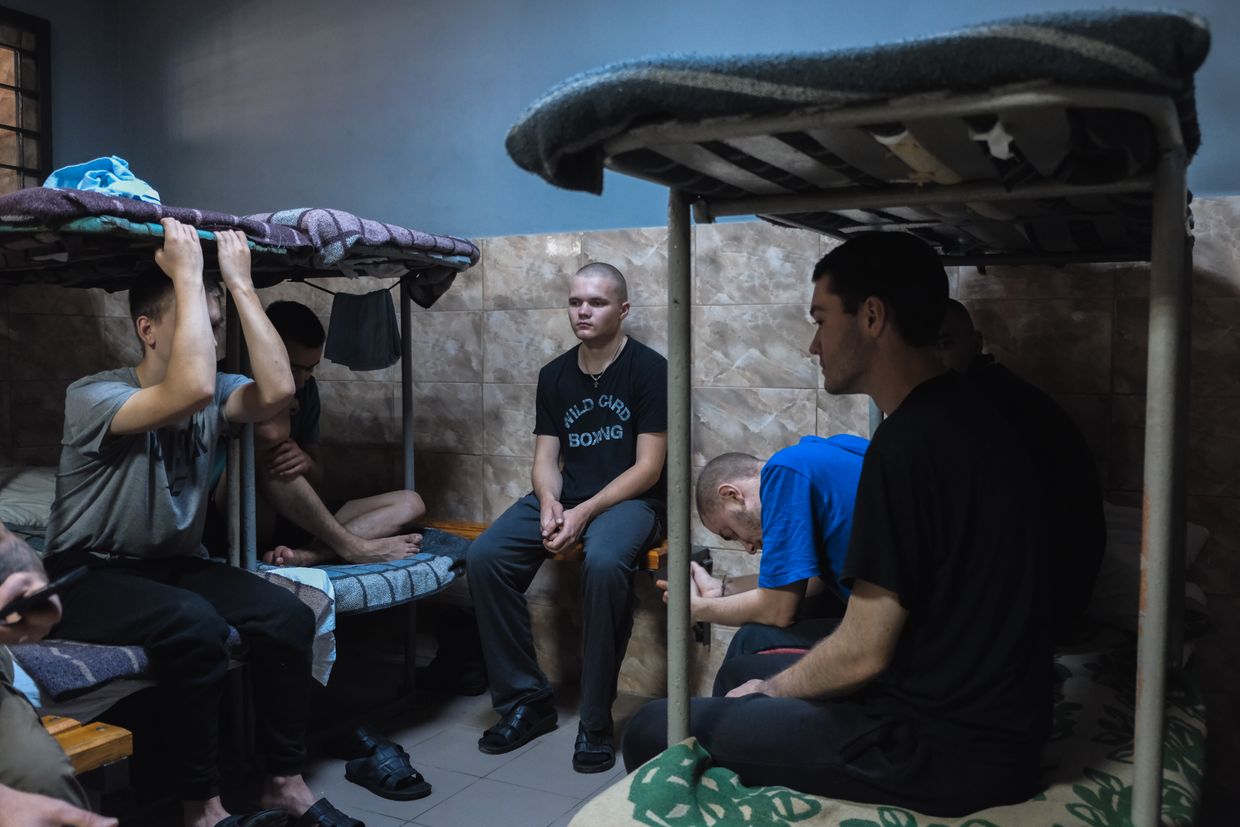Ukraine's victory delayed by West's fears of Russian defeat, Canadian-Ukrainian lawyer turned soldier says
Canadian-Ukrainian lawyer serving in Ukraine's Territorial Defense Forces continues promoting investment, sees defense sector undergoing “seismic shift”

Daniel Bilak, a Canadian-Ukrainian lawyer living in Ukraine. (The Kyiv Independent)
Daniel Bilak is a Canadian-Ukrainian lawyer living in Ukraine for decades, taking on critical roles in what has been a rollercoaster career amidst Ukraine's fight to prosper while defending its freedom.
He has played a big role in attracting investment into the country, first as a lawyer and later, from 2016 to 2019, as chief investment advisor to Ukraine's prime minister and head of the government's UkraineInvest agency.
After Russia launched its full-scale invasion in early 2022, Bilak joined Ukraine's Territorial Defense Forces and is now part of a unit that protects Kyiv's skies from Russian drones and missiles.
As a partner at the Kyiv offices of Kinstellar, Bilak simultaneously continues work as a lawyer.
Kinstellar has advised German defense industry giant Rheinmetall on forging a cooperation agreement with Ukraine's state-owned arms concern Ukroboronprom that involves joint maintenance of military equipment provided by Germany, as well as the future "transfer of technology, (and) joint production of selected Rheinmetall products in Ukraine."
While still Ukraine's defense minister, Oleksii Reznikov issued an award to Bilak recognizing his work "For Support of the Armed Forces of Ukraine."
The Kyiv Independent interviewed Bilak, asking the lawyer-turned-soldier about how the West sees Ukraine, why it takes so much time to receive the required arms and military technology, and how safe it is for companies, including military ones, to invest in Ukraine.

The Kyiv Independent: There are discussions in the West that people are getting tired of helping Ukraine. What would you say to those who feel this way?
Daniel Bilak: These people who say they're tired of Ukraine have never faced an enemy like the one that we are facing. The gruesome brutality of a genocidal colonial empire is an awesome thing to behold.
It's absolutely astounding that we have held them off. We've been supported by our allies, but not enough. And this is the biggest problem that the West and democracies have – understanding that Ukraine is at the epicenter of global change, but also the epicenter of global security.
What happens here is going to determine what happens in other places, in the Middle East, in Taiwan, in Southeast Asia, and in Africa. Because if we have dictators running around unhinged, unfettered, and completely without any sort of accountability for their actions … we will see the end of the international world order.
We're repeating all of that, this soft appeasement. I mean, the Poles of all people, the Latvians, the Romanians are afraid to shoot down Russian Shahed (Iranian drones provided to Russia) that invade their airspace.
(Russian President Vladimir) Putin's great strategic victory to this point has been getting inside the heads of U.S. President Joe Biden and Germany Chancellor Olaf Scholz, especially. There are others that he has forced to self-deter.
For six months, we basically held them off by ourselves at enormous cost when the Americans and our other allies were not funding us. We were begging for anti-missile systems to at least close the skies over Kharkiv, Dnipro, and Odesa, which were being just pulverized. Seven Patriot missile systems we asked for out of a hundred that are in Europe, and nobody gave us anything.

The Kyiv Independent: How do you explain that?
Daniel Bilak: The West is really playing with fire in not understanding that its own security, especially the security of the European continent, runs through Ukraine. And unless you stand up to dictators, they will always double down.
Putin has gotten inside their heads. He's got all these red lines, and everybody's afraid to cross. I mean, this is a guy who hid inside a bunker for two years because he was afraid of a virus. It's highly unlikely that he's going to launch a nuclear war.
In fact, the heads of the CIA and British MI5 basically said the other day in an interview that he's just gaming us, and he's making the Americans and the Germans especially self-deter.
It's not just that they're afraid of Putin. They're afraid of the consequences of what happens if Russia loses. They are afraid of us winning.
They know we can win this war and defeat the Russians.
We drove them out of Kyiv, Kharkiv, and Kherson. Had our allies not stopped us, we probably could have won this war by the spring of 2023. But this fear of what happens if Russia loses is basically creating a situation where they're holding us on a tight leash.
It is morally repugnant to have a policy that says we will not allow the Ukrainians to defend themselves by giving them long-range weapons to hit Russian targets inside Russia that are killing Ukrainian citizens.
"It is morally repugnant to have a policy that says we will not allow the Ukrainians to defend themselves."
And that is something that the leaders of our allies are going to have to be held accountable for. And there's no reason for it because of this great fear of some sort of escalation. We crossed all of Putin's red lines, from HIMARS to battle tanks, to the Black Sea, to other systems.
And now we crossed the ultimate red line, which was invading Russia in Kursk. And what was Putin's response?
By invading Kursk, by invading Russia, Ukraine has shown that all of these red lines don't mean anything.
The Kyiv Independent: Why don't they want Ukraine to win?
Daniel Bilak: Because they're afraid of Russia losing. They're afraid of the consequences in case Russia collapses.
This is the same thing that happened in 1991 when George H. W. Bush came to Kyiv and gave his so-called 'chicken Kyiv' speech to warn Ukrainians against suicidal nationalism.
'Don't leave the Soviet Union,' because they were worried about what would happen to the nuclear weapons. Well, in the end, everything worked out. We actually gave up the nuclear weapons that were on our territory and let the Russians keep theirs, and now we have the situation that we're actually paying for that decision.
The Kyiv Independent: Is it safe to invest in Ukraine now?
Daniel Bilak: Our firm, Kinstellar, works (on this) very, very deeply … the most immediate trend is investing in the defense sector. And that includes large prime contractors, as they're called. These are global giants – Rheinmetall, KNDS, Babcock, Northrop Grumman, BAE Systems, all of whom are looking to invest in Ukraine. As well as the military technology sector, which is involved, especially in the drone space.
It's very hard for me to even convey what a seismic shift this is in the economy and for the military.
When I was at UkraineInvest, I was trying to hive off Antonov from Ukroboronprom, which is now called Ukrainian Defense Industries. It wasn't even a company – the government called it a defense concern, and it had hundreds, if not thousands of companies under it. It was a monopolist.
All of that has now changed. And a lot of these big companies are coming into Ukraine now for the first time – nobody was ever allowed in before. But now they're coming in with their investments, their technology, their know-how. And they are doing joint ventures with state-owned enterprises to build a Ukrainian, dynamic economic hub.
It's easier to do defense manufacturing now in Ukraine than in almost any other place in Europe, because we have a very big need for that.
Then you have the other side, which is drones. We are advancing technologically.
Some British companies told me we're 30 years ahead of them because our technologies go through iterations and generational changes every three months instead of every three years. And nobody can keep up with this pace of change.
And so there are ways for Ukrainian drone companies and drone companies abroad to work together because they need access to our technologies, and we need access to some of their technologies and to their components. We want to swap out the Chinese components and use British, or U.S., or German – or from other countries.

We will become a really essential part of the global supply chains of these military giants down the road.
Once the war ends, we will continue to produce military goods, but we will have lots of other things to do. The construction and infrastructure sector is going to be a massive undertaking. We have whole cities to rebuild.
Energy sector is also part of it, but we are not going to go back to building massive Soviet hydroelectric or nuclear plants. We may move to small mobile nuclear reactors, or to something smaller for district heating operations. We can't make these (military) targets of big plants anymore.
So the national security aspects are going to become part of the design of the economic aspect of rebuilding Ukraine.
The Kyiv Independent: Let's talk about the Russian narratives that are spread about Ukraine abroad. Do you think that Ukraine succeeded in messaging to the West about the Russian war against Ukraine? What can be improved? What should change?
Daniel Bilak: Russia has been doing disinformation for many years.
It is very complicated for Ukrainians to get their message out. I was trying to do that when I was at UkraineInvest, but you have to have people willing to listen.
And unfortunately, Russia has 'useful idiots' in the media in the West, or paid agents. These echo chambers have a positive view of Russia and a negative view of Ukraine. And it's very difficult to break that.
I think the war started doing that, but we still see the reporting in many Western newspapers as being sort of slanted towards 'Russia's so much bigger and it's so much stronger.' And none of that has any basis in reality on the ground, but it's a matter of the perceptions. And once those public perceptions are formed and they're in the heads of policymakers, media, and the general public, it's really hard to break.
There has been some great reporting in the United States and in other countries about what's happening in Ukraine and how resilient we are.
Russia's preparing for a war with NATO. And I think that NATO countries are starting to understand that. The chiefs of the defense staff of many NATO countries have spoken about this. NATO Secretary General Jens Stoltenberg talked about this.

Everybody knows that within 3, or 5, or 7 years, there could be a major war with Russia if the Ukraine issue isn't solved. And Russia knows it's not ready to fight NATO militarily.
So what it's trying to do is undermine the faith of people, of citizens in democratic countries, in the legitimacy of their institutions – that there is no truth, that there is nothing you can really do. (Russia is) creating fake websites and NGOs that then fund extremist groups.
It's a very, very sophisticated disinformation campaign, plus sabotage.
The only way you can deal with it is, to tell the truth, but you need influencers to tell the truth or to point out the facts, just as the United States did with the Russian invasion of Ukraine and is still doing with other Russia plans to create false flag operations.
The Kyiv Independent: If there's one Russian narrative that is the most dangerous at the moment that has been spread around, what is it?
Daniel Bilak: The Russian idea that Ukraine has no hope of winning, and the West should stop supporting it because it's a waste of time. 'Get them to the table and capitulate.'












